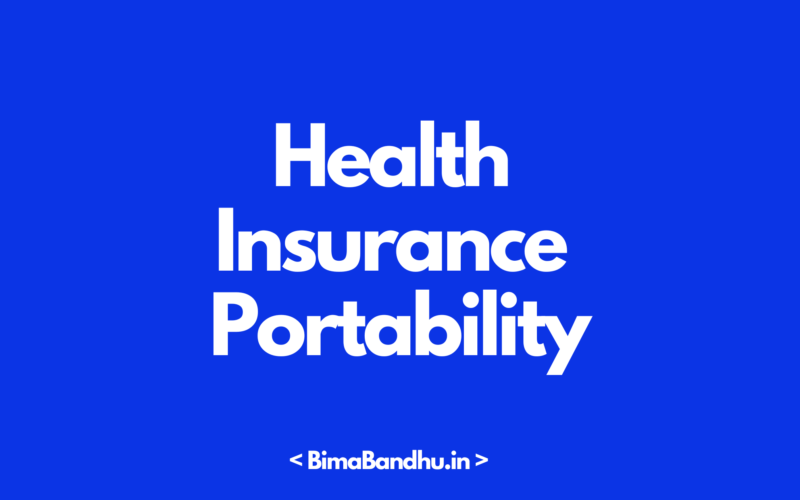Let’s start with an example that will help you understand the need for health insurance portability –
Mr. Mehra, a 35-year-old man, suffers from heart problems and he specified the condition while buying a health insurance policy. When the chosen insurance company raised the policy premium, he felt he would not be able to afford it and hence, wants to switch to another insurer. At the same time, he was equally worried that the new insurance company will consider his application differently and impose a waiting period for his pre-existing disease again. He wondered if he can port health insurance policy without hassles.
Many individuals like Mr. Mehra go through the dilemma of switching from one insurer to another. For them all, the Insurance Regulatory and Development Authority (IRDA) issued health insurance portability guidelines under which a health policyholder can port his policy to a new insurer without losing the benefits (including the waiting period for pre-existing disease) being accumulated from the existing insurance provider.
Let’s talk more about health insurance portability in this guide.
What is Health Insurance Portability?
It is a method devised and introduced by the IRDA that allows health insurance policyholders to transfer or port their existing health policies to a new insurance provider. Portability makes it easier for you to transfer the credits/benefits related to pre-existing conditions when switching from one health plan to another (from the same insurer) or from one insurance company to another.
The IRDA introduced health insurance portability in 2011. This method gives policyholders the much-needed flexibility to get adequate insurance coverage from the right insurance company. At the same time, health insurance portability does not allow insurers to take their policyholders for granted.
The best part about porting a medical insurance plan is about getting the freedom to change the health insurance provider, without losing the accrued benefits from the previous plan. You can carry forward the waiting period that you have already served to get insurance cover for any pre-existing disease.
What are the Health Insurance Portability Rights of Policyholders?
As an insurance policyholder, you have the right of portability provided you have maintained the previous policy without fail. To avail of the benefits of health insurance portability, you need to apply for the same to the new insurance company with which you wish to port the policy. The application should be filed at least forty-five days before the renewal date of your existing policy. In case you fail to do so, the ball then lies in the insurer’s court to decide if your application for portability is to be considered.
What are the Insurer’s Rights related to Health Insurance Portability?
On one hand, the IRDA empowered insurance policyholders with health insurance portability rights. While on the other hand, it has also given insurance companies the right to reject portability requests, subject to scrutiny by the underwriter.
Once the underwriter checks the risk exposure to determine chargeable insurance premium, the portability application is taken forward. If deemed unfavorable, the new insurer can reject the application. In that case, the insured does not have any other solution but continues with the existing insurer or buys a new policy from another insurer after losing the previous policy’s benefits.
Why Do You Need the Benefits of Health Insurance Portability?
You can choose to port your health policy from the current insurer to a new one on various ground, including:
- Improper service quality
- Lack of adequate coverage for specific health conditions
- Time-consuming reimbursement process
- Cumbersome claim settlement
- Increase in premium in case of filing claim during the policy period
- Hidden terms and clauses
- Unclear copayment terms
- Lower room rent limits
- Getting better offer from another insurer
What are the Pros and Cons of Opting for Health Insurance Portability?
Every coin has two sides, and the same is true for insurance portability. Dig down deeper to understand whether to opt for porting your health insurance policy or not.
Pros
- Facility to change or modify the policy as per your lifestyle and improved health condition
- Easy to opt for additional insurance cover or addition of new nominee
- Transfer of accrued bonus from the existing policy for calculation of new sum insured
- Comprehensive insurance benefits and better deals
Cons
- Only possible when the policy is due for renewal, not otherwise
- Portability to similar kind of policies only, not different ones
- Additional benefits available at high policy premiums
- Loss of benefits in case of porting from group insurance policies to individual plans
You May Also Like to Read: All About Coronavirus Health Insurance
What are the Benefits of Porting Health Insurance Policies?
There are several advantages of health insurance portability, such as:
- Ease of customizing the policy to match your current needs
- Use of accumulated No Claim Bonus (NCB) to reduce the new premium payable
- Facility to keep the existing benefits while also availing new ones from a different insurer
- Availability of best plans at lower prices because of competition in the insurance sector
What are the Rules and Specific Terms Related to Health Insurance Portability?
-
Similarity Between Policy Types
Under the health insurance portability rules, you can only port similar health plans, i.e., one reimbursement plan to another reimbursement plan (similarly for top-up plans, family plans, and individual policies).
-
Insurer Type
You can port the policy from a specialized or general insurance company to another insurer – specialized or general.
-
Policy Renewal
You can benefit from health insurance portability before the time of policy renewal only, and not any other period. Also, it is important for you to renew the policy without breaks.
-
Portability Intimation
Whenever you wish to opt for health insurance portability, you must notify the current insurer in writing at least 45 days before the policy renewal date as per IRDA’s circular. You should also mention the new insurance company you wish to port the policy to.
-
Acknowledgment
The insurers are informed to acknowledge the health insurance portability applications in three days.
-
Porting Fees
No fee is charged in the health insurance portability process.
-
Premiums After Porting Policy
Insurance companies have the right to charge premiums as per the underwriting norms. It means the policy premium may not remain the same for similar benefits after you port the policy. Individuals falling in the high-risk category may have to pay higher premium after porting the policy.
-
Grace Period Related to Portability
In some cases, the health insurance portability applications are under process or new insurance companies have not yet given their decision till you reach the 30-day grace period. To get extended insurance coverage, you need to pay a premium to the current insurer on pro rata basis. You cannot be forced to pay the premium for the entire year.
-
Change in Sum Insured
As a policyholder, you can choose to increase the minimum sum insured on porting the policy. The approval of granting higher sum insured is subject to the underwriting of the new insurer. Also, the new insurance company you select must provide at least the sum insured chosen in the old policy.
-
Waiting Period for Pre-existing Conditions
If your old policy has a waiting period of three years for certain pre-existing diseases while the new insurer mandates a four-year waiting period, you only need to serve one additional year if you have already served the three-year period. This will give you coverage for pre-existing diseases under the new policy. However, if you choose to increase the cover, you may need to serve the entire waiting period again.
-
Portability within the Same Company
You can also port out from one health insurance plan to another plan offered by the same insurance company as per the rules laid out by the IRDA.
Also Read: A Complete Guide to Insurance in India
What are the Reasons for Rejection of Health Insurance Portability Applications?
As per the IRDA guidelines, the insurance companies have the right to reject a health insurance portability request if it does not match their terms and conditions. In general, portability applications can be rejected on the grounds of:
- Delaying to submit the required documents
- Lack of required information
- Frequent claim history in the recent past
- Significant differences between the features and benefits of current health insurance policy and the one he/she wishes to port it to
- Lack of previous policy documents (portability requires the last policy documents for at least three years)
- Breaks in renewing the policy on time
You should also know that the underwriting norms and health insurance portability rejection reasons may also vary from insurer to insurer. The underwriter also reserves the right to reject any request on various valid grounds.
Some other possible reasons or grounds for rejections of health insurance portability requests are:
-
Higher age
Since senior citizens have fewer choices of health insurance policies available for adequate coverage, many insurance companies feel skeptical about accepting their portability requests. In some cases, they tend to apply stringent underwriting terms, charge a high premium, and include a different co-payment clause.
-
Portability from family floater plans
Individuals who face serious health issues and need enhanced cover beyond what the floater plan offers, usually try to port out of the plan. In cases where a policyholder wants to port out a member from the floater plan to a policy with a higher sum insured, the health insurance portability requests are likely to get rejected.
-
Unfavorable Health History
The portability applications also get rejected if the insured has been diagnosed with significant health problems. This is the reason why medical tests become mandatory, particularly for people aged 45+ at the time of processing portability requests. The diagnosis of ‘high-risk’ diseases can also lead to outright rejection of health insurance portability requests.
What are the Documents Required for Health Insurance Portability?
The new insurance company requires you to submit certain documents to port your health insurance policy. You need to ask for the following documents from your previous insurer to port the policy:
- Previous years’ policy certificates
- Self-declaration in case of claim-free years
- Latest renewal notice which mentions the coverage continuity and other aspects
- Medical documents like investigation report, discharge summary, etc. in case you have filed the claims
Once you have all these health insurance portability documents handy, you need to fill the proposal form and portability form to begin the process.
What is the Process Followed for Health Insurance Portability?
The process of porting a health insurance policy includes the following steps after you submit the portability request:
- You will receive a proposal form and portability form from the new insurance company, along with the details of their policies.
- You need to select a suitable policy and submit the duly filled forms to the insurer.
- After receiving the forms from you, the new insurer will check for your details like medical records and claim history at the IRDA’s common data sharing portal.
- On the other hand, the existing insurer also needs to furnish all the required details within seven working days. The new insurer can hold the health insurance portability requests in case of delays.
- After receiving all the requisite information, the new insurer has to decide on underwriting a policy in 15 days. If the insurance company fails to take the decision in this period, then they are bound to accept the portability request.
Is It Possible to Port from Family Floater or Group Insurance Plans to Individual Health Plans?
If you are already covered under a group health insurance policy from your employer or family floater policy, you can choose to port to an individual plan based on the insurer’s terms. Firstly, you need to switch to a health plan that the current insurer offers. You are only permitted to switch to a new insurance company after completing one year.
Also, keep in mind the following things before you port the policy:
- Before you make any switch, it is advisable to compare the current and new policy in terms of premium, sum insured, entry age, sub-limits, waiting period, and hospital network.
- If you fall in the ‘high-risk’ category, you may end up paying a higher premium after porting the policy.
- Portability becomes difficult in the later years of life because the insurance companies will not agree to take the risk of covering a senior citizen.
Things to Consider While Making Health Insurance Portability Requests
- Medical history
- Increase in sum insured
- Waiting period for various pre-existing diseases
- Premium payable to the new insurer
- Your age
- Providing correct information while filling portability forms
Health Insurance Portability FAQs
-
How can I port my health insurance plan?
You need to follow the health insurance portability process defined above and inform your insurer about this decision at least 45 days prior to the policy renewal date.
-
Is it good to choose health insurance portability?
There are both pros and cons associated with porting a health policy to a new insurer. Hence, you should carefully weigh various aspects before making any final decision.
-
What will happen if I port my medical insurance policy?
With health insurance portability, your policy will be ported to a new insurer of your choice, while retaining the benefits and credits you have gained with the previous policy/insurer.
-
Can I opt for health insurance portability online?
Ask your current insurer about the process to be followed. If it is possible to follow the process online, you will get the details from your insurance company.
Get Health Insurance Portability Gyan on BimaBandhu
Porting a health insurance policy from one insurer to another is a significant decision that will impact your insurance coverage. Hence, it is crucial to get in-depth knowledge about health insurance portability before you make any decision. Choose BimaBandhu – the one-stop destination for detailed guides related to insurance benefits and more.






